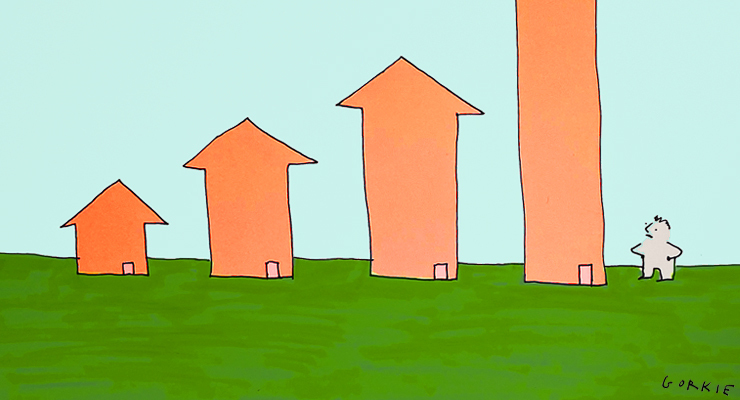
The Morrison government is being haunted by an election horror of 15 years ago as it concedes the cost of paying off mortgages will rise.
The Reserve Bank’s obligation to clobber inflation when it breaks out of its economic comfort zone has made the government so anxious that some inflation-inducing measures expected in the March 29 budget, such as its long-boasted expensive tax cuts, have been deferred.
That’s because something politically more serious than reneging on tax cuts could happen: an interest rate rise during the election campaign.
Voters might blame Putin for higher petrol prices, but only Scott Morrison would be held responsible for higher home loan costs. The political consequences could be as huge as our rampant real estate market.
Treasurer Josh Frydenberg on Radio National today said help for households fighting inflation would be “temporary, targeted measures”. And he conceded inflation at 3.5% and feared to be heading to 5% was “more elevated than previous thought”.
The government hopes to avoid an interest rise in the next two months before the poll expected on May 14, but is already accepting it won’t be put off forever. Rates will go up soon and there will be a string of them through the rest of the year, as forecast by the finance industry. Banks might increase mortgage rates as the cost of cash sourced overseas goes up.
If the RBA is to keep inflation within the boundaries of 2-3%, as required by its brief, it will have to increase record low official interest rates now at 0.1%. That would damage household finances for thousands of voters and severely weaken the government’s claims to be top economic managers.
Morrison says interest rates under Labor would go up “more than they need to”, an acknowledgment that his government couldn’t prevent rises completely.
For once it’s a political problem which can’t be resolved by the Liberals’ much resorted to question: what would John Howard do? The former Liberal prime minister narrowly dodged an interest rate rise during the 2004 election campaign but soon after they went up six times, including during the campaign for the 2007 election in which he lost his seat as well as government.
Two weeks before the November 24 poll the RBA pushed the official rate up by 0.25 percentage points to 6.756%. Howard was behind in the polls, much like Morrison today, but could not prevent the rate rises that worsened his electoral changes.
“I would say to the borrowers of this country who are affected by this change, that I am sorry about that,” he said before the November 2007 election. “I regret the additional burden that will be put upon them as a result.”
The Howard experience is a haunting fixture in Liberal lore. And the burden Howard bemoaned would be much greater this election. The figures are staggering. The consequences could be as huge as our rampant real estate market.
The government’s own calculation is that low interest rates have been a $600-a-month saving for those with a $500,000 mortgage. A rate rise would see that saving stunted.
Australians now own $9.9 trillion worth of real estate with a 25% jump — $2 trillion — in the past 12 months. These owners had to get the money from somewhere, and most borrowed big as prices rose and the minuscule official interest rate of 0.1% produced cheap mortgages.
The Australian Bureau of Statistics calculates that Australian home owners and renovators took out loans between January and October last year worth $305 billion, the bulkiest borrowing of its type recorded by the bureau. The ABS says the total borrow for the 10 months was more than for all of 2020. And it reports that loans for owner-occupiers and real estate investors jumped by 2.6%, or $33.6 billion, in January this year alone.
Cheap mortgages would disappear as the official rate went up, adding higher repayments to already strained household expenses.
Frydenberg has conceded the obvious and advised punters to factor high loan costs in their household budgets just as business is doing. He told Nine newspapers this week that “the market has been pricing in — it’s a statement of fact — higher interest rates in due course”. He doesn’t comment often on interest futures — at least in public — as that might be seen as pressuring the RBA.
Same with Labor’s Ttreasury spokesman Jim Chalmers, who also has saluted the RBA as the decision-maker. But he has scoffed at Morrison’s implicit claim that interest rate rises were certain if Labor wins the election.
“I think the message from the Reserve Bank governor [Philip Lowe] yesterday was unsurprising in lots of ways,” Chalmers said on March 3. “He said that interest rates can’t stay near zero forever, but he’s in no rush. The RBA board, which is independent, doesn’t seem to be in a rush to raise rates.
“The other important point: at no point does he say that it’s dependent on who wins the next federal election. These sorts of issues that he’s been talking about are independent of who might be in power.”








At least John Howard said “sorry” when interest rates went up during the election campaign. At best, Scomo would blame Labor, in the middle he’d blame Putin, at worst he’d deny it had happened. “I’m sorry” would never happen.
Scummo doesn’t hold an apology either.
I think Australians are going to be in a world of pain in the near future. Interest rates rising, housing (lack of, prices), petrol, Covid, stagnant wages, inequality, you get my drift. A lot of people are going to struggle even more than they are now. Very concerning.
There is actually plenty of Housing. It’s the prices and high rentals causing the issues. A raise in interest rates (to a reasonable level) should reduce capacity to repay and thereby reduce borrowings and the demand for housing. There should be a price reduction in some areas but most likely a “pause”.
Either way we are headed for a Recession or worse I suspect.
Sorry mate, but you’re wrong. Just a few years ago, when I was still involved with real estate data, housing in NSW alone was some 200,000 below market demand. It’s even worse for social housing where there isn’t a town in this state with a waiting list of less than ten years. I doubt things have improved over the last 4 years.
Perhaps there is a discrepancy between houses for $ale/rent and houses vacant?
Probably only a couple or four zeroes.
I wasn’t referring to Social Housing which is always in short supply. As to standard Sales and Rentals it depends on multiple factors and locations (NSW is not Australia and even the market in Sydney varies immensely from area to area) “just a few years ago” is a long time. There is no single “Australian Market” but in general, demand is waning, prices are declining and rising interest rates will reduce it further.
https://www.scmp.com/business/article/3162078/australias-housing-market-faces-headwinds-supply-likely-outpace-demand
https://propertyupdate.com.au/property-predictions-for-2022-revealed/#what8217s-ahead-for-property-values-in-2022
Excellent source of info, Lex. And they rightly point out that demand includes those who wish a house but can’t possibly buy. Those are also the people who end up paying high, unregulated rents. I wonder if Australia will ever come around to European style affordable housing systems.
Not going to happen here. Too much love of property and increasing prices in this country. Buying your first house is a big deal and, for most people, requires serious sacrifice. Unfortunately, and I have personally seen a lot of this, a lot of people expect to have the same as their parents have or better, close to where they work, at a price they want to pay while having 2 kids and driving a new (often Euro – why I don’t know) car. In other words, their expectations are unrealistic and unattainable.
Thete is a belief in this country that everyone can buy a house but it’s a fallacy that we refuse to acknowledge.
Social Housing is necessary however Government doesn’t seem interested.
If there really was plenty of housing, prices and rents wouldn’t be so high.
Again, it depends on where, what type of housing etc. Prices have flatenned and are falling in some areas.
The trick is how to provide several hundreds of thousands dwellings across the nation without sending the average mortgage holder broke. They do this elsewhere in the world with affordable and social housing programs, where rental conditions are strictly controlled, not dissimilar to the council house system we used to have.
It could be easily funded via the future fund and/or the super funds. We’re not talking about giving housing away. There would be a return on investment at least as high as these funds get right now, with the added benefit of revitalising our manufacturing industry. Not to mention enabling families on low incomes to live with dignity, just as our grandfathers used to.
As I said, this what they do all over the world one way or another, I don’t know why find it so difficult…
Legislative capture?
First B1 then B2 then back to B-.
Although the means may seem at variance the end is the same.
It would be interesting to know how much housing is taken off the market for Air-BNBs, and how much of those are fueled by the ‘investors’ rorting the public with the free capital gains rorts, unearned franking credits and other assorted thievery, all to the list of the Lying Rodent and Peter Costello’s wealthfare policies.
Whats the bet the lowlife LNP are quietly trying bully or otherwise coerce the RBA into delaying the interest rate rise. This will get them off the hook and give tgem something to blame Labor for later.
The amount taken by diesel excise is far larger than that from petrol.
The vast majority of that is returned as rebates to farmers & miners.
It is also the most used fuel in the transport industry..diesel goes up everything goes up – food – petrol- home furnishings etc
“Australians now own $9.9 trillion worth of real estate with a 25% jump — $2 trillion — in the past 12 months. These owners had to get the money from somewhere, and most borrowed big as prices rose and the minuscule official interest rate of 0.1% produced cheap mortgages.”
And overly expensive property prices.
If a rate rise slows or eliminates the increase in property prices, then it should be seen as a positive.
“Two weeks before the November 24 poll the RBA pushed the official rate up by 0.25 percentage points to 6.756%”
Puts into perspective a potential interest rate rise to ~0.25% – 0.50%.